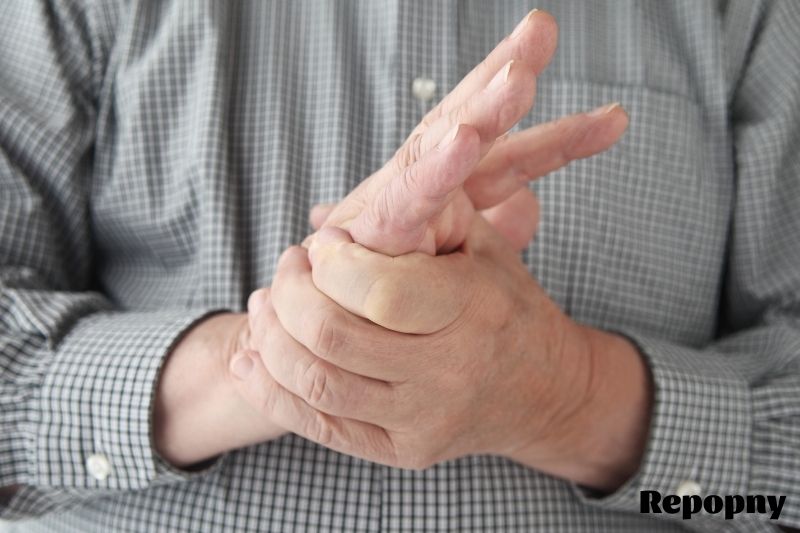There are many potential causes of why do my hands go numb when I sleep. It could be due to poor circulation, pressure on nerves, or exposure to cold temperatures. In this article, Repopny will look at a few of the possible causes and discuss some remedies that can be taken to alleviate them.
Contents
Why Do I Have Numb Hands When I Wake Up?
Numbness in your arms or hands is a sensory loss caused by several factors. Because a nerve was crushed, your circulation was cut off by your sleeping posture, or because of an underlying condition, your hands or arms may become numb or “fall asleep.”
Numbness is sometimes accompanied by a tingling or pins and needles sensation known as paresthesia. Paresthesia, like numbness, can occur when sleeping due to particular sleeping positions. Nerve compression and some underlying health conditions are linked to numbness and paresthesia.
Nerve Damage or Compression
A damaged or crushed nerve is a typical cause of numb hands during sleeping. Repetitive movements in the hands and arms might cause nerve damage4. When a person’s job causes this injury, the symptoms are known as “working hand syndrome.”
Numbness, soreness, and tingling in the hands are more common among those who perform repetitive movements with their hands and arms for work, especially at night.
Nerve damage that causes numbness and tingling in the hands, also known as peripheral neuropathy, can be caused by various factors other than repetitive manual activity. Drug use, illness, inherited disease, injury, or inflammation can all cause identical symptoms.
Ulnar Nerve Compression
The ulnar nerve controls the muscles in your forearm that allow you to hold objects. In both the front and back of your hand, it also transmits feeling to your pinky and the portion of your ring finger adjacent to your pinky.
When you hit the inside of your elbow, often known as your “funny bone,” you may experience numbness, discomfort, or shock caused by the ulnar nerve.
Too much pressure on your elbow or wrist might cause ulnar nerve compression.
If you sleep with your arms and hands curled inward, you may have numbness in the following areas:
- your pinky and your ring finger’s pinky side
- under these fingers, the area of your palm
- under these fingers on the back of your hand
Cubital tunnel syndrome can occur due to continued compression of the ulnar nerve. Make an appointment with your healthcare professional if your numbness is accompanied by pain or weakness. They might suggest doing some exercises at home or wearing an elbow brace regularly.
Median Nerve Compression
The median nerve controls the muscles and sensations of your index and middle fingers. It’s also in charge of the muscles and feelings in the middle finger side of your ring fingers and the palm side of your thumb.
Because compression of the median nerve often occurs around the elbow or wrist, curling up in the fetal posture can cause numbness:
- index, middle, and half of your ring finger on the front (palm) side of your thumb (the half on the middle finger side)
- on the palm side, around the base of your thumb
Carpal tunnel syndrome is caused by continued compression of the median nerve at the wrist, yet your sleeping posture is unlikely to drive it on its own.
Radial Nerve Compression
The radial nerve controls the muscles that stretch your fingers and wrist. It’s also in charge of the strengths and feelings in your thumb and back of your hand.
Compression of the radial nerve can occur if you apply too much pressure above your wrist or along your forearm.
For example, if you fall asleep on your arm or wrist, you may have numbness:
- in the middle of your index finger
- your thumb on the backside
- in the webbing between your thumb and index finger
Radial tunnel syndrome is caused by pressure on the radial nerve, but it usually does not cause numbness in your fingers or hand. Instead, you’ll most likely feel discomfort in your forearm, elbow, and wrist.
Other Medical Issues That Cause Hand Numbness
You may wake up with numbness in your hands for various reasons, including compressed nerves. Other medical conditions that might produce numbness include:
- Cervical Spondylosis: Cervical spondylosis is a chronic degenerative illness that affects the neck’s muscles, tendons, and bones. It is more common in older people. Neck pain, stiffness and discomfort, and numbness in the arms, shoulders, and fingers are common symptoms.
- Thoracic Outlet Syndrome is a condition in which blood vessels in the upper chest are compressed or irritated due to anatomical differences in the muscles in that area. Whiplash or other neck injuries is the most common cause of thoracic outlet syndrome. Repetitive motions or, less typically, the presence of an additional rib can cause the illness.
- Diabetes Mellitus: Also known as type 2 diabetes, this condition is marked by the body’s inability to use or produce insulin, leading to nerve damage properly. Numbness and tingling sensations in the hands and feet can be caused by nerve injury.
How To Manga It
Changing your sleeping posture might help relieve nerve compression at night.
Here are a few pointers that may be useful:
- Sleeping in the fetal position is not recommended. Sleeping with your arms and elbows bent might create numbness by putting more significant strain on your nerves. To make it more difficult to turn over and curl up in your sleep, tuck your covers in securely.
- Keep your arms out at your sides if you sleep on your stomach. Sleeping with them under your body can create numbness due to excessive pressure.
- Instead of sleeping with your arms above your head, sleep with them at your sides. By cutting off circulation to your hands, sleeping with your arms above your head might create numbness.
- Avoid sleeping with your arms folded under your pillow. The weight of your head might compress a nerve by putting pressure on your wrists or elbows.
- Of course, controlling your body motions when sleeping is difficult so you may require some assistance.
- If you have difficulties keeping your elbows or wrists straight while sleeping, consider using an immobilizing brace. Your elbows and wrists will be unable to move due to this.
- These braces are available for both your elbow and wrist on the internet. You can also create your mount by wrapping a towel around and anchoring the part you want to immobilize.
- Whether you buy a brace or create one yourself, make sure it’s tight enough to keep you from falling asleep with it on but not so close that it causes further compression.
- Your body may acclimatize to this new position after a few weeks of use, and you can stop wearing the brace to bed.
When Should You See A Doctor?
If you’ve tried sleeping in different positions and wearing a brace at night but still have numbness in your hands, you should schedule an appointment with your doctor.
See a doctor if you have any of the following symptoms:
- numbness that persists throughout the day
- numbness in other body areas, such as the shoulders, neck, or back
- numbness in both hands or just one part
- muscle wasting
- clumsiness in the fingers or hands
- Arms or legs with sluggish reflexes
- aches and pains in your hands and arms
SIGNS OF WARNING
Keep in mind that abrupt numbness can sometimes signal a stroke, especially if the following symptoms accompany it:
- dizziness or weakness
- On the one hand, there is paralysis.
- Confused or unable to communicate
- a loss of equilibrium
- horrible throbbing headache
A stroke necessitates rapid medical assistance. If you have any of these symptoms, you should seek immediate medical attention.
FAQs
When should I be concerned about numbness in my hands?
If numbness in your hands lasts longer than a few minutes, you should seek medical help right once. It could indicate a significant medical problem. It’s vital to seek medical help if you’re experiencing any of the following symptoms: Other parts of your body are numb.
Why do my arms and hands get numb at night?
The most common cause of a numb hand or arm is prolonged sitting or sleeping in the same position. This can put pressure on your nerves and block off blood flow, resulting in numbness for a short period.
When I lay on my side, why do my hands fall asleep?
If your hands become numb as you sleep, a nerve running from your neck to your hand is likely squeezed. Because nerves have their blood supply, pressure on them cuts off that supply, depriving them of oxygen and nutrition, causing them to shut down.
Video
Conclusion
Suppose you are numb in the hands while sleeping. It could be due to an underlying medical condition, such as carpal tunnel syndrome or diabetes. Sleeping in an awkward position can also compress nerves and cause numbness.
If the numbness is accompanied by pain or tingling, it may be a sign of nerve damage. In most cases, numbness in the hands while sleeping is not a serious condition and will resolve independently.
It is essential to see a doctor if this occurs regularly, as it could signify an underlying medical condition.
Related Post:





